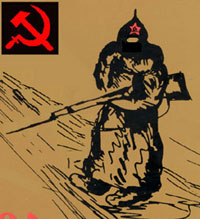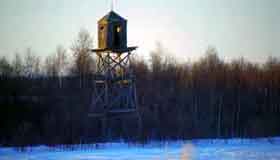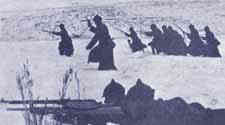| 1 : Germany & Russia Attack Poland (IT IS BELOW !) | 4 : Back to Work | |
| 2 : The Train to Russian Internment | 5 : 1941 - News of Release | |
| 3 : A Stay in Hospital Near to Death | 6 : Imprisoned Again |
1 : 1939 - Germany and Russia Attack Poland |
 |
There were cases where cavalry men were charging tanks. The idea was to ride to the tank, hop on it, lift the flap and throw a hand grenade in. This was sometimes successful, but inevitably suicidal. Next the Russian hordes moved in from the East. Some of the Polish troops were moved to Hungary, France and finally to Britain. My father was called up at the beginning of the war, and was posted to Lachwa, on the Russian border, where he commanded a detachment of frontier guards. He was the only commander who opened fire on Russian troops. When ammunition was getting low, he sent his men home, the best way they could, while he remained at the machine gun to cover their retreat. This was observed by a Russian commander, who ordered his troops to take him alive. It was meant to impress his men that a good soldier is always respected. When the last bullet was spent, my father was taken prisoner. Some time later we received a letter from him. He was in Kazakhstan slaving in an iron ore mine. We were living in a small town called Malkowicze, in the very heart of the Polesian forest, on the railway line between bigger towns of Baranowicze in the north and Luniniec in the south. It was a few days before Russian troops came there. In the meantime, local Russians and Bialorussins, led by well known ruffian Vladimir Strach (Strakh), decided to form a committee to run the town. Strach ordered a public meeting, which was held in a square near the railway station. He opened the meeting by addressing the public: "Tovarishchy, my pryshli zdies' vybrat' comitiet - predsiedatielom ja budu". (Comrades, we came here to elect a committee - chairman I shall be. Anybody against?). His cronies rattled their rifles, which they had taken from an abandoned police station, where they were kept for use in training by youth cadet organisation, of which I was a member. No one said a word. "Right" he said, "accepted unanimously". The Deputy chairman was Misha Khudinovich, the only decent man among them, appointed because he was well educated, and they needed someone who could command respect. And so the committee was elected and Bolshevik democracy established. Shortly after, a unit of Russian infantry arrived to occupy the area. They patrolled the town and the surrounding countryside. Russian soldiers were very nervous. There was an incident when a Belorussian peasant's wife ran outside, after her husband had beaten her up, shouting "help, this bandit is killing me". A passing Russian patrol heard this and opened fire. Another patrol hearing that, also opened fire, then the main unit opened fire. This lasted for some two hours. Like programmed robots, Russian soldiers off duty were going around telling everybody "My imiejem vsio, piervogo kachestva, dastatochnogo kalichestva". (We have everything, first quality in sufficient amounts). And all using the same wording. But in the meantime, they were grabbing what they could and sending it to Russia. The Russian captain, commander of the unit, also was grabbing what he could, only on a bigger scale. He wanted to have a plywood trunk made and somebody told him that my grandfather could make him one, so the captain came to see him. Grandfather agreed, as he wanted to talk to a Russian officer. While making the trunk, they had a conversation. Grandfather asked him about the situation in Russia, but captain appeared too embarrassed to answer. Then my grandfather said "Vy staryj khram rozgramili, a novogo nie sumieli postroit' ": (You have destroyed your old shrine and failed to build a new one). The Russian was startled, and looked around to see if somebody was listening and said nothing, obviously agreeing with the statement. * * * |
|
One night Mrs Wieczorek, my old school-teacher came to see me and said that General Jasinski was hiding at her place and wanted to contact a man in Nowosiolki, who would take him across the border. Next day I saddled my horse and went to Nowosiolki, some 10 km away. I rode over the frozen marshes, as the Russians were patrolling all the roads. On arrival at Nowosiolki, I went to see the Tarajewicz family, who directed me to Slawomir Rawicz's home, some 3km away in the middle of the forest. After seeing him and making the arrangement, I went home, but this time riding through the forest, as I might have been seen on the open marshes, and the Russians would have got suspicious. Winter was setting in very hard. The great chairman Strach was finally bought and was passing information about Russian intentions. A number of families were deported to Siberia, among them our neighbour Jaworski's family. My friend Wladyslaw Skory, a forest ranger, was arrested and kept at a local police station, without any food. He would have died of starvation if I had not taken him some. Later on he was sent to a Russian prison. Soon after, I was told that the Russians were going to arrest all members of the youth organisation to which I belonged. That night I had a bath, packed my hunting bag with some underwear and some food, took a little money, kissed my mother and my younger brother good-bye and left, never to return. Friends at the railway station got me a ticket to Lomza. Two of my school friends, Jana and Ewa Blazewicz traveled with me. We went through Baranowicze, Wolkowysk and Bialystok. Between Wolkowysk and Bialystok the NKVD were checking all passengers. I was carrying a suitcase for one of the girls. A NKVD man checked the contents and asked what was it. Was it contraband? I said I was taking it to my sister who is at the college in Bialystok. They accepted that and let me go. The girls said that they were going to the college and they too were allowed to continue. Between Bialystok and Lomza there was another passenger check. This time, we managed to move over to the group which had been checked already, and so avoided the search. We finally arrived at number 17, Stacha Konwy street in Lomza, a pre-arranged address where Mr Tomaszewski lived. The winter was very hard that year. When we arrived to Lomza the moon was full and the nights were very light. We decided to wait a few days before crossing the border, hoping the nights would get darker. But the nights were so light that you could see the silhouette of a man from a mile away. After waiting a few days I got impatient and decided to go. Tomaszewski's son took me to within 3km of the border from where I had to walk. I asked young Tomaszewski all about the area, names of the villages, any landmarks, woodlands and the best places to cross the border. The country there was very open and flat and the snow was deep. After walking a while I spotted a horse-drawn sledge, escorted by a Russian soldier. Realising that I had been seen already, I decided to walk on and bluff my way through. The Russian stopped me and asked my name, address and where I was going. I said I was going to Zacierie and that I lived there. He then asked the names of a number of villages and what were various land marks. I gave him the correct answers and he accepted that I was local and let me go. On arrival at Zacierie, at a pre-arranged address, I found people somewhat nervous. Russian patrols were very active, as the previous night a number of escapees were captured. I had to stay in the hay loft until the night. It was impossible to cross the border at that time, so I decided to return to Lomza and wait. I walked in the night, mostly off the road, avoiding the Russian patrols. In Lomza, the girls got short of money and decided to sell some jewelry, which they had brought as a reserve. Tomaszewski had contacted a dealer who came over and bought the jewelry and the girls decided to go to the station and return home. Soon after, the girls' father Mr Blazewicz and his friend Jaworski arrived from Malkowicze. They hardly had time to sit down, when the NKVD men surrounded the house. The dealer had sold us out to the NKVD. They were paying well for information about escapees. Several NKVD entered the house and started to question us. They wanted to know who we were, where we came from and what we were doing there? They turned to Tomaszewski and asked if he had any fire arms? He said "yes". "Where is it?" He opened his fly and said "here"! The officer yelled "Nie shutsi starik" (don't joke, old man). We were all arrested and taken to the NKVD station, located in the old seminary, where we were put in the cellars separately, so that we could not know who said what. Before we were separated I told my friend that I would say that my name is Polkowski, so as to protect my mother, and said that I don't know any one of them there. Blazewicz assumed the name of Tomaszewski, and said that he was a relative of the householder. * * * |
|
In my cellar there were about 50 people. Some of them were smugglers and they were bragging about their exploits, describing how they came from Warsaw, describing the route in minute details. I memorised the route, the time of departure and arrival and prepared my story. When I was taken for interrogation, they asked my name and where I came from? I told them my name was Polkowski Franciszek and that I came from Rabiany near Warsaw. This I did because I didn't want them to trace my mother, and I knew that there was a more severe sentence for trying to escape than for coming in. When asked why I came, I told them that my uncle was somewhere in Bialystok and I came to find him. "How did you come?" they asked. I boarded the train at Wawer, came to the river Narew where the bridge was blown up, walked over an improvised bridge, boarded another train and came to Ostroleka. From Ostroleka I walked to Lomza. How did you cross the border? I didn't know there was any border there. As far as I knew, the border was over 100 km away from here and I just walked on, it is only about 8km away. "What time did the train arrive at Ostroleka?" At 8pm. How did you come to stay with Tomaszewski's?" It was too late to go to Bialystok and I couldn't afford a hotel and I was allowed to stay with Tomaszewski's for nothing. At that time an army officer came in and reported the arrival of a number of captives. The NKVD men jumped at him "How are you guarding the border"? This boy came from Ostroleka last night and nobody stopped him. I shall report you to a higher authority. The interrogation lasted for several weeks. Their interrogation methods included forcing a confession to whatever they accused you of, usually of spying, through inflicting pain. They would make you sit on a small stool with sharp edges and corners which cut into your spine. This would become very painful after a while. Next they would put special handcuffs on, which would tighten up and stop the circulation so that your hands would turn blue and painful, then numb. Next they would put you against the wall and pretend they were going to shoot you. Then while one was holding a gun to your head, another would come in, saying "Don't shoot him, he is a young man, let him be, he will tell me everything". Then he would start questioning, first gently, then finishing the same way as the first one. They would grab you at about two o'clock after midnight, when you are most deeply asleep and start firing questions and if your answers were different than the first ones, they would really make you suffer. In my cellar was a well known engineer called Stanislawski. They accused him of spying. His interrogations were never ending. They would wake him at two in the morning, drag him to their office and torture him for hours. When they brought him back, he was covered in bruises, bleeding and completely exhausted, unable to walk. We would have to pick him up and put him on the bench. After a few weeks, they took him out and he didn't come back. At one side of the cellar was an ex-policeman, whose name I have forgotten, also major Wazecha and Mr Bengurian, a Jewish gentleman, a typical old scholar. Everybody respected him, and I believe he was the one who became the future prime minister of Israel. Major Wazecha was suffering from advanced tuberculosis, but was not receiving any medical help. * * * |
| I had got friendly
with a young engineer from Warsaw, Mieczyslaw Chmielewski, who I had confided
in about my false name and address to protect my mother. This had been
fortunate as he was approached by the ex-policeman who had realised that
I did not have a Warsaw dialect, and was concerned that I might be a Russian
plant put there to gather information, and Chmielewski had been able to
reassure them about me. Also in the cellar, there was a very unusual man,
who went by the name of Kramaz. He was looking like a native of Caucasus,
middle size, dark complexion with black hair, streaked with white. He
slept under the bench in the straw, which had been pushed off the bench
when it became too lousy. In the morning he would get out from there,
sit on the bench, ask somebody to sweep the lice off him and start telling
what was going to happen that day. So many will be interrogated, so many
will be hurt badly, so many will be moved and so many new ones brought
in. All the time I was there, he was never wrong. Sometimes we thought he would be wrong as the midnight approached and no one had come or gone out. Then there would be a rattle of the locks and somebody would come in or be taken out, as Kramaz predicted. He was always right, and yet his interrogation was over and he had no contact with outside. Next to our cellar was a cellar full of women. Somebody had scratched out a hole in the dividing wall and we could talk with them. They too were infested with lice. One day we were told that an official from Minsk was coming for an inspection. The women have gathered as many lice as they could, a matchbox full, and waited. When the official came, they complained about food and lice. He just said they were getting their rations and, as for lice, it was their own fault. They then threw the lice at him and he shot out of the cellar. Soon after I was moved from the old seminary cellars to Lomza prison, and placed in a cell on the third floor. The window was overlooking the forts between Lomza and Ostroleka. One night they brought about twenty young Poles into the prison yard whom they caught training in the woods. They stripped them naked, put them in the lorry, and took them to the forts, stood them against the wall and machine-gunned them. They must have realised that we had seen that mass murder, as the next day they put up wooden screens on the windows. Time went on and everybody was on edge. Then somebody made a suggestion to make a hunger strike. A piece of cloth was stripped, threads were tied up, a small pebble was tied up to the end, and a message attached. By swinging the thread sideways and lowering it down, it would pass by another window and was caught. Within a few days the whole prison was in communication. The day was arranged and the entire prison went on hunger strike. Prison guards were surprised and could not understand how thousands of people could be doing the same thing at once. An official came in and said everything will be sorted out soon. A few days later, we were taken out into the yard in groups of fifty, surrounded by guards with rifles and machine-guns, and with dog handlers. At night time, they escorted us to the railway station and loaded us in to the cattle trucks. After a few groups had gone through, the entire town of Lomza was on it's feet and at railway station. Women and children calling names of those arrested: "Stasiu, Janku, Bolku, Ojcze (daddy)" and so on... There was an occasional rifle fire, bursts of machine-gun fire and barking and howling of dogs. |
|
| 1 : 1939 - Germany & Russia Attack Poland | 4 : Back to Work | |
| 2 : The Train to Russian Internment | 5 : 1941 - News of Release | |
| 3 : A Stay in Hospital Near to Death | 6 : Imprisoned Again |
 MEMOIRS
OF
MEMOIRS
OF
 armament
poured in. Having so little anti-tank artillery, it was impossible to
stop them.
armament
poured in. Having so little anti-tank artillery, it was impossible to
stop them. 